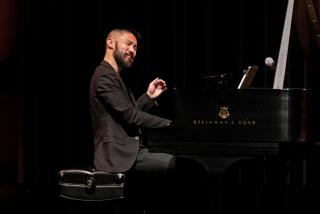PIANIST KEYS ON LISZT IN GETTY SERIES
- Share via
The place of Franz Liszt in a larger consideration of the Romantic period is still a matter of controversy. The reassessment continues--and will go on, no doubt--long past the Hungarian composer’s centenary last year.
No final answers were offered, but a good time was had by many at the second program in a series titled “The Age of Romanticism,” Saturday night at the J. Paul Getty Museum in Malibu. Pianist Steven Mayer devoted his entire agenda to works connected with the much-publicized rivalry, in mid-1830s Paris, between Liszt and Sigismond Thalberg. As are all performances in this summer series, the recital was given in the open-air, Inner Peristyle Garden of the Museum, with acoustical help from a canopy fitted with a leaded vinyl backing.
Mayer, a young American now on the faculty at the Manhattan School of Music in New York City, may not be the best Lisztian exponent to deliver a program encompassing an adaptation/abridgement of Weber’s F-minor Konzertstueck, operatic fantasies by both rivals and late-period Liszt pieces. Most of the time, Mayer commands the appropriate technique but, on the basis of this one hearing (the program was repeated Sunday), he does not always wield all the resources of temperament.
What Mayer played most convincingly, in this very demanding list of works, was the piece requiring the deepest concentration and most projected sense of line, the “Benediction de Dieu dans la Solitude,” wherein he produced an oversize lyric sound, melting legato and a handsome--if not, finally, comprehensive--range of pianistic colors. “Benediction de Dieu,” you will remember, is a florid, post-Schubertian display/meditation in G-flat which sounds a lot like “Home on the Range.”
The rest proved considerably less compelling. Mayer’s transcription of the Weber piece seemed to eschew the highlights of that fiery work; his playing of fantasies and a divertissement on arias from “Niobe” and “Moise,” and on “God Save the Queen,” reproduced the difficulties but not the panache one hoped for. His closing volley, the 15th Hungarian Rhapsody, though mechanically solid, failed to raise the prevailing temperature. All that reliable technique seemed to have been gathered to no avail.
With spoken annotations by one of the series’ masterminds, Robert Winter, the survey continues next weekend with a program called “Chopin and the Vocal Style,” to be performed by pianist Charles Rosen, with singers Cynthia Westphal Johnson and Rickie Weiner Gole.
More to Read
The biggest entertainment stories
Get our big stories about Hollywood, film, television, music, arts, culture and more right in your inbox as soon as they publish.
You may occasionally receive promotional content from the Los Angeles Times.










